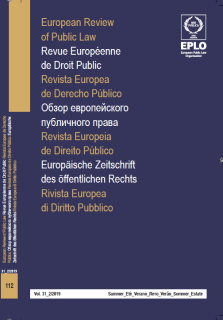
Google it! -
The EU Approach to Technology and the Risk for the Rights of Privacy
of its Citizens
Professor at the School of Law of the University of Lisbon
This text corresponds to the reviewed oral conference held before the International Conference “The European Union and its Citizens” that was organized in Cascais, Portugal, for the occasion of the opening of the European Public Law Organization (EPLO)’s Portuguese branch. Its purpose is to question the clash between the wonders of technology and scientific discoveries and, on the other hand, the risks for the rights of individuals, especially the right to privacy. Accordingly, the article adopts the image of Jeremy Bentham’s Panopticon, in order to portray the contemporary Digital Age (and its digital prisons). It questions the abuse of the collection of Big Data by public and, especially, by private entities and analyzes the growing consolidation of a system of permanent social surveillance that has its “top-down” and “bottom-up” mechanisms. Furthermore, taking into consideration the developments of EU Law, it addresses the emergence of the “right to be forgotten” as a fundamental right of each citizen and proposes legal and comprehensive measures in order to impose its respect.
Ce texte correspond a une approche révisée d’une communication orale prononcée lors de la Conférence internationale “L’Union européenne et ses citoyens”, qui a été organisée à Cascais, Portugal, à l’occasion de l’inauguration de la branche portugaise de l’EPLO. Le but de ce texte est de s’interroger sur le conflit entre les merveilles de la technologie et des découvertes scientifiques, et d’autre part les risques pour les droits des individus, notamment le droit à la vie privée. Par conséquent, l’article adopte l’image du Panopticon de Jeremy Bentham, afin d’esquisser l’Ere Numérique contemporaine (et ses prisons numériques). Il s’interroge sur l’abus de la collecte des Big Data par des entités publiques, et surtout privées, et analyse la consolidation croissante d’un système de surveillance sociale permanente qui a ses mécanismes “top-down” et “bottom-up”. En plus, compte tenu des développements en droit de l’UE, l’article aborde l’émergence du “droit à l’oubli” en tant que droit fondamental de chaque citoyen et propose de mesures juridiques et exhaustives afin d’imposer le respect à ce droit.
* The text corresponds to the reviewed oral conference held before the International Conference “The European Union and its Citizens” that was organized in Cascais, Portugal, for the occasion of the opening of the European Public Law Organization (EPLO)’s Portuguese branch.





















